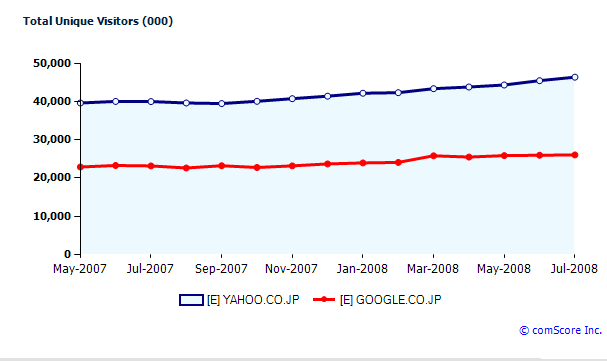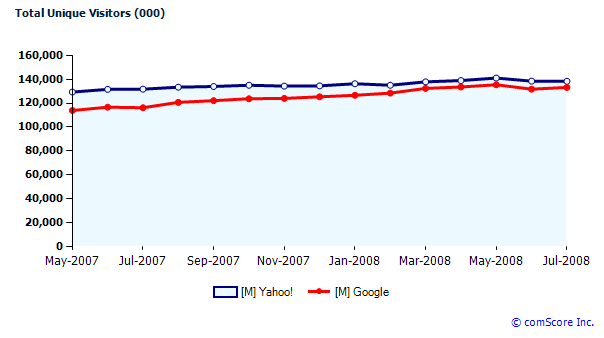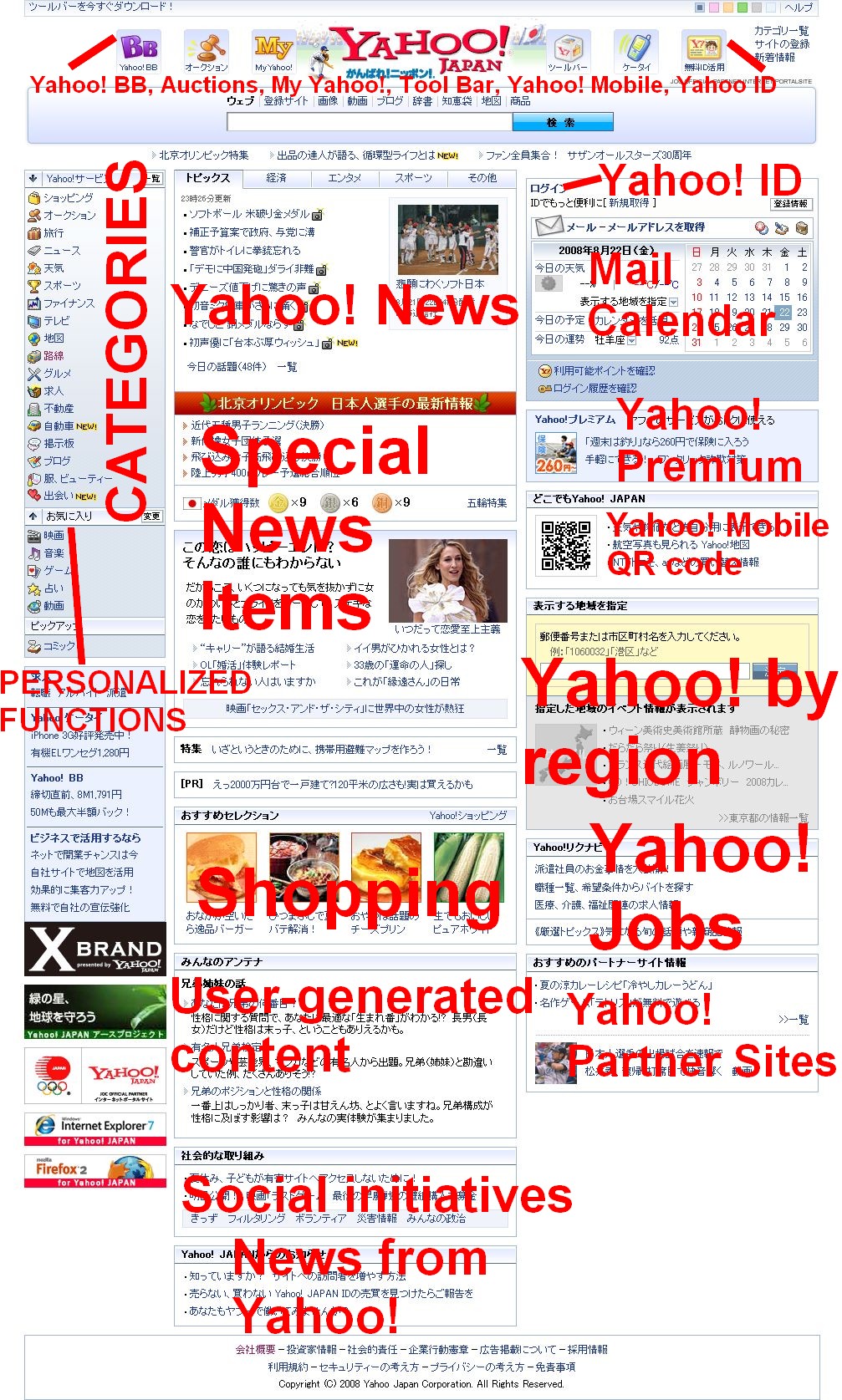 Yahoo’s stake in Yahoo Japan is often cited as one of its most valuable assets, and indeed Yahoo is considering selling it as a quick fix to appease angry shareholders in the U.S. While Yahoo seems to be treading water in the US, Yahoo Japan is sitting on top of the Japanese web industry. In fact, Yahoo Japan’s market cap at the Tokyo stock exchange is hovering at around $22 billion, compared to Yahoo’s current $27 billion. Fiscal 2007 marked the 11th consecutive year of profitability and record revenues: Yahoo Japan’s sales grew 23.3% to $2.4 billion (Yahoo in the US: $7 billion) on a year-to-year basis, with a net income of $570 million (US: $660 million).
Yahoo’s stake in Yahoo Japan is often cited as one of its most valuable assets, and indeed Yahoo is considering selling it as a quick fix to appease angry shareholders in the U.S. While Yahoo seems to be treading water in the US, Yahoo Japan is sitting on top of the Japanese web industry. In fact, Yahoo Japan’s market cap at the Tokyo stock exchange is hovering at around $22 billion, compared to Yahoo’s current $27 billion. Fiscal 2007 marked the 11th consecutive year of profitability and record revenues: Yahoo Japan’s sales grew 23.3% to $2.4 billion (Yahoo in the US: $7 billion) on a year-to-year basis, with a net income of $570 million (US: $660 million).
With 46 million monthly unique visitors, according to comScore, Yahoo Japan reaches 82 percent of all Internet users in the country. That compares to 26 million monthly uniques (or a 46 percent reach) for Google in Japan. (In the U.S., the two are neck and neck, with Yahoo drawing 138 million monthly uniques, and Google 133 million). Alexa also has been ranking Yahoo Japan at No. 1 for years now.
It’s no exaggeration to say that for millions of light users in Japan, the Yahoo portal site is almost synonymous with the web itself. Here are three major reasons (and possible hints for other web companies wanting to expand internationally) for this dominance:
1. Get a Headstart and Help From a Local Powerhouse
Yahoo Japan incorporated in January 1996, just 11 months after its parent company did (Google waited 3 years to open a Tokyo office in 2001).
Currently, Yahoo Japan is owned 40% by local telecommunications powerhouse SoftBank and 33% by Yahoo in the US, demonstrating a textbook perfect Japanese-foreign joint venture structure.
SoftBank’s founder Masayoshi Son, Japan’s richest man (who says his company one day will rule the global web), doubles as Yahoo Japan’s chairman. The site is also the default starting page for SoftBank’s 15 million mobile web (“Yahoo Keitai”) subscribers.
2. Super-Localization Is the Key
In terms of structure, design and scope, Yahoo Japan is significantly different from the US site (see screenshot). The site may look cluttered to Non-Japanese eyes, but users in Nippon prefer (if not even expect) these crammed starting pages.
Yahoo Japan is split into 11 differentiated business units, i.e. search, auctions, member and regional services, media, mobile, lifestyle etc.
What’s particularly interesting from an American perspective is that almost nobody in auction-crazy Japan knows Ebay although the company opened a Tokyo office as early as October 1999 (Yahoo Japan Auctions started just one month earlier). Ebay finally gave up in 2001 but came back in late 2007 with Sekaimon, an intermediary enabling Japanese users to access Ebay with their Yahoo Japan IDs and through translated menus.
Yahoo Japan Auctions boasted a transaction volume of $6.5 billion in fiscal 2007 (mobile and fixed Internet), whereas American users can’t sell off stuff on Yahoo anymore since June 2007.
Additional services exclusive to Yahoo Japan include Yahoo Videocast (a video portal for cell phones and PCs), the Digg clone Minna no Topikkusu (Everybody’s Topics), Yahoo Days (a social network) and Netallica (an entertainment news sub-site).
The company offers a number of mobile- and Japan-only applications and is also involved in the Internet banking business.
3. Do Business The Japanese Way: A Finger In Every Pie
Over the years, Yahoo Japan diversified into an influential web, telecommunications and media conglomerate, now encompassing dozens of consolidated subdiaries and affiliates: It merged with and acquired advertising firms, information processing companies, marketing research providers, map software makers etc.
The company has managed to build up a Japanese identity by
- employing 3,500 people in one of Japan’s most prestigious office complexes
- foraying into Japan’s multi-billion dollar TV business with the development of widgets for digital TV programs and “Yahoo Japan for Aquos”, a Sharp TV-optimized version of the site with future plans for video distribution
- establishing Yahoo BB, one of Japan’s first ISPs to offer low-cost, fixed-charge price plans for broadband connections
- launching a sponsored service, which enables users to read a number of print magazines online and free of charge (stirring up the notoriously conservative local publishing business)
- buying the naming rights for the Fukuoka Dome (now Fukuoka Yahoo Japan Dome), a major baseball stadium in Southern Japan
- partnering up with other local web companies such as video portal Nico Nico Douga, Myspace Japan (i.e. for the distribution of Japanese music news) and mobile application provider jig
The strategy of total Japanization paid off for the company (which is even an official sponsor of the country’s Beijing Olympic Team). There are few serious competitors on the horizon which could endanger Yahoo Japan’s premier position, at least not in the foreseeable future. Is Yahoo Japan an anomaly, or is it a model of how to go international on the Web?


